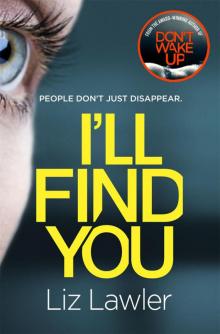- Home
- Liz Lawler
I'll Find You
I'll Find You Read online
Contents
Prologue
Chapter One
Chapter Two
Chapter Three
Chapter Four
Chapter Five
Chapter Six
Chapter Seven
Chapter Eight
Chapter Nine
Chapter Ten
Chapter Eleven
Chapter Twelve
Chapter Thirteen
Chapter Fourteen
Chapter Fifteen
Chapter Sixteen
Chapter Seventeen
Chapter Eighteen
Chapter Nineteen
Chapter Twenty
Chapter Twenty-One
Chapter Twenty-Two
Chapter Twenty-Three
Chapter Twenty-Four
Chapter Twenty-Five
Chapter Twenty-Six
Chapter Twenty-Seven
Chapter Twenty-Eight
Chapter Twenty-Nine
Chapter Thirty
Chapter Thirty-One
Chapter Thirty-Two
Chapter Thirty-Three
Chapter Thirty-Four
Chapter Thirty-Five
Chapter Thirty-Six
Chapter Thirty-Seven
Chapter Thirty-Eight
Chapter Thirty-Nine
Chapter Forty
Chapter Forty-One
Chapter Forty-Two
Chapter Forty-Three
Chapter Forty-Four
Chapter Forty-Five
Chapter Forty-Six
Chapter Forty-Seven
Chapter Forty-Eight
Chapter Forty-Nine
Chapter Fifty
Chapter Fifty-One
Chapter Fifty-Two
Chapter Fifty-Three
Acknowledgements
About the Author
Copyright
Prologue
Courage abandoned her as she stared into the darkness. Her legs turned to rubber, as if she’d run long and hard, and her heart thudded as she dragged in air. Her mind froze with indecision. She needed to get a grip. To just get on with it and start searching, before the porter returned and caught her there. Her week of spying on him and following and noting down times of his every movement could change. His nightly routine of hanging up his porter’s jacket in the staffroom, with keys still in the pocket, before getting into his car and driving off-site to one of three neighbouring takeaways was no guarantee he would not return any moment and catch her in the act. She needed to be quick.
She pressed her trembling hands together, attempting to squeeze away the tremors, and stiffened her legs to give them strength. It was not the fear of looking that stopped her taking this step, it was the fear of what she would find.
She reached out and patted the wall, feeling for the light switch, hearing the pings and buzz of electricity as each Perspex square on the ceiling above illuminated brightly. The noise filled her ears and in her heightened state she imagined it being heard outside the building. She listened intently, but the momentary sounds had already ceased, and she could find no more reason to abandon her mission. The place was silent except for the sound of her own breathing.
The room – rectangular, windowless and very private – looked like a bank vault with safe deposit boxes, where clients were taken and left in privacy to open a box and store their most valuable items. The difference here was in the size of the boxes. Each was big enough to take a body. The first and last were even bigger and were used to take the largest of the cadavers. On one wall she counted twelve doors – enough fridges for twelve bodies. That meant there were twelve spaces to check, not counting those on the facing wall. If she hurried she could be out of there in minutes, have the keys back in the porter’s pocket with him none the wiser to her being there. It may only take the opening of one door to find who she was looking for . . .
The small terracotta floor tiles were worn and the black scuff marks told of the back-and-forth journeys of rubber-wheeled trolleys. Parked trolleys and a hydraulic lift sat at the far end of the room, the lift plugged in for battery charging. A single chair was set against a drab grey wall.
She would open doors from left to right, bottom to top so that she didn’t miss any out.
She made her way to the nearest fridge and gripped the handle. The heavy door opened with barely a sound and cold air cooled her heated face. The cadaver was zipped inside a white body bag. She held her breath, not wanting to breathe in the air of the dead, the lingering scent of hundreds of bodies that had lain here before. The temperature was set to keep bodies cool, but could not prevent rot. When she finally took a breath, she was relieved to find that all she could smell were the harsh chemicals that the fridges had been sterilised with. Her fingers trembled as she eased open the zip, relief flooding her as she saw grey, wispy hair. Inside was a featureless old man or woman with hollowed-out cheeks. She closed the bag, shut the door and moved to open the fridge above. Her eyes fixed on a bald head, noticing wrinkles and liver spots. There were similar bodies in the next few chambers, with more grey hair on some, whispery white patches on others, a peach-coloured afro on another, then a shock of white-blonde hair tied back with a scrap of bandage. Someone young.
Resting for a moment, she tried not to imagine a face to fit that body. She unzipped the next bag, gagged and had to cover her mouth. The head was charred black with red congealed blood that had settled like jellied lava pushing through burst skin. She banged the door shut and gulped the air, trying not to imagine the particles of dead flesh that she could be inhaling. The dead can’t hurt you, she whispered into her cupped hand. Only to discover a moment later that they could. Inside the next fridge was a tiny, cocooned shape wrapped in a white sheet. She felt an unbearable ache inside her throat. There was a pink teddy lying atop the shrouded baby. It may have been a gift from the parents, and she felt unforgivably intrusive for seeing something so private and precious.
She slumped to the floor and leaned back against the cold steel. She was torturing herself in this place. She should have requested this search in the presence of someone else; demanded that they show her the inside of every fridge, but she couldn’t run the risk of being refused or seeing the pity in their eyes as they reluctantly agreed. They would think she had lost her mind to request such a search. As far as they were concerned the patient had simply absconded and was not one of the dead lying in this mortuary.
She crawled to the last two doors and reached up to open the top one first. Hardened by what she had already seen, she unzipped the bag fast and was surprised to see the soles of feet. The underside of the toes was pure white, the arches and heels dark purple. They were young feet, smooth and unworn by time. They could be male or female, though they were small. Using the door to steady herself she stood up and felt her insides buck as she saw the painted toenails. Blue’s so much prettier, don’t you think? It shows off your tan better. With fingertips, she reached in and touched the feet. They were cold. She cried out, unable to stop herself. It could be her. A white identity band circled the left ankle, the name hidden from view. She twisted the band slowly until she saw a printed name: Jane Doe. It was the name used for an unknown, the unidentified. Her breath felt ragged. Until she saw the face, she couldn’t be sure.
The body was in the fridge but the wrong way round. She would have to pull out the tray to see the face. She gripped its rim and pulled, but it didn’t slide out. She tugged harder, but it stayed put. She stared at the sides of the tray to try and see why it was stuck but could see nothing obvious. Maybe it just needed a stronger pull. She placed a foot against the door below, leaned back and pushed hard with her foot to put her weight behind the tug, but it was hopeless. The tray refused to move. Frustrated, she stared in at the body bag, stari
ng at the space above it. Calculating. Thinking. Maybe there was enough room for her to climb in over it. The compartment was bigger than the others, and there was a further tray slot midway up the wall, room for a second body. She would have to unzip the bag as she went along so that when she got to the end the bag would be completely open. But fear filled her. The space looked so small, a narrow icy tunnel with only darkness at the end. She would have no room to turn around. She would have to get out of the fridge feet first, slide over the uncovered body and pray she held her nerve.
Placing her knee gingerly on the tray, she positioned herself; left foot on the left side, right foot on the right side. Keeping her head low and her weight off the body, she crab-crawled her way in. The air she breathed was dense and cold and it chilled her skin as it clung to her. Her thighs were already beginning to tremble as she held herself awkwardly on toes and hands, in a spread-eagled press-up. Arching her back to relieve the stress, she was startled as she felt the ceiling pressing down on her, reminding her how tiny the crawl space was. She gulped at the air, trying to quell her rising panic. She needed to use her knees to take her weight, so that she could rest on her elbows. She shook from the strain of her position and needed to get comfortable. Clumsily she moved one knee forward as the edge of the metal tray dug into the bone, before bringing the other forward to lessen the pressure. She brought her shoulders back and straightened her arms so that she was on all fours, and immediately realised her error. She was now higher, her back a solid plane fixed in position, a feeling of weight on top of her as she pressed against the roof. She had taken up all the space with her change of position and now she was stuck.
She struggled, instinctively, shaking her head like a rabid dog stuck in a hole, banging it against the steel, grunting with the effort to get free, but her hands and knees were locked and her inability to go backwards or forwards petrified her. She wheezed, a whistling sound as her airway closed, and then, spent, weak with effort, she flopped down, resting on the body beneath her. She touched the plastic bag, feeling its smoothness, its coolness, and slowly her limbs stretched out and she realised how foolish she was to have panicked. There was enough room for both her and this body.
Moving her hand beneath her, she reached down as far as her fingers could stretch, searching for the zipper. Her fingers fumbled as they touched the bag, and she felt a solid mass beneath, but no goddamn zip. Her face mashed against the plastic as she half twisted, pushing her shoulder down and straining her muscles to reach it. Please, please just give it to me, she chanted inside her head, and then let out a cry of victory as the metal piece slid between her fingers. Wasting no more energy she pulled the zipper towards her. The scratching of metal against plastic echoed loudly in the confined space. She stopped as she reached the neck, seeing the sudden strands of dark hair, her fingers becoming like boneless appendages as they touched its softness. Tears blurred her vision and she was thankful for the watery screen. She could view the face through a teary waterfall and climb back out of here and still not know if it was her. She could hold on to the hope that she wasn’t dead.
She blinked away the tears and let her eyes adjust to the darkness. Slowly she brought the zip all the way up to see the top of the head, and somewhere in the region of where her heart lay, she felt a stillness. An absence of a heartbeat to match the one against her. The eyes were closed, lips pulled together and skin a washed-out milky grey. She gazed at the face. Then it came. A crushing, a squeezing, a pressing feeling right inside her heart. She had found her.
‘Wake up,’ she whimpered. Then, shoving the body hard, she yelled: ‘Wake up, damn you. Stop fucking playing about!’
She wrapped her arms and legs around the unyielding form, trying to make it move. ‘You’re not dead,’ she cried. ‘You’re just cold. People can be brought back to life when they’re cold. You simply have to get warm. Come on. Wake up. Please!’
Shuddering with grief she huddled into the still figure, placing her warm face against the cold face, her tears and mucus dripping down the neck of the body she held. Her cries changed from howls to sobs to whimpers as her mind slowly absorbed reality. Her search had finally ended. She could now lie there. She would stay for ever. She would not leave her in the dark. Stay there till—
The fridge began to hum, a healthy sound to indicate it was on. The air had suddenly become colder. Solid blackness filled the space where she lay. The square of light, from where she had crawled into the space, was now gone. While she lay there someone had entered the morgue. Someone had seen the fridge open. Someone had closed the door.
Chapter One
Emily stirred at the sound of the cries. Someone was calling for help. They sounded desperate. Terrified. In need of urgent care. Her throat felt restricted, clogged somehow, and she was unable to call out to reassure the person, to tell them she was there, that she was coming. She swallowed the heaviness from her throat so she could speak. ‘I’m here,’ she rasped, opening her eyes and gazing blearily up at the white ceiling above. ‘I’m here,’ she whispered, feeling desolate in the quietness of the room, knowing the cries she’d heard were hers alone. She was home, safe in her bed, not in an icy tomb. Her eyes and throat ached with the memory of her dream. Her face was damp with tears; tears that came when she slept – when she dreamed that Zoe was dead. The mortuary was the last place in the hospital she had searched for her sister. No one had been able to account for her disappearance. She had been a patient one minute, and a missing person the next. But when the days had become a week, when the police were no further forward with finding her, Emily had felt that she had no other choice but to look for her there.
In her dreams she always found her. In her dreams she held Zoe in that fridge. Not the body of a Jane Doe who had been deliberately placed in the fridge with her feet to the door out of respect, as she had been decapitated in a motorbike accident. Emily had been holding the head in her hands when they opened the fridge door and found her. She remembered nothing after unzipping that body bag, apart from the detached head. She had shut down after seeing something so horrible. Only the solid darkness, an awareness the door had been closed, had revived her enough to cry out and say she was there.
*
The day the call came, Emily had already been awake. She’d been up since the crack of dawn, in the middle of painting this room she was in now. The window had been open, and the radio was blaring as she tried to work off her annoyance with Zoe. She’d been startled to recognise the voice of one of the doctors she worked with and initially thought he was calling about a work-related issue. When he said it was her sister he was calling about, Emily had felt her gut clench, imagining a car accident, a fatal injury. He’d quickly reassured her and said that Zoe was on the observation unit and there was no need to rush. Her sister was sleeping soundly and had suffered no ill effects from the large quantity of alcohol consumed. She had a saline drip and would probably wake up bright and breezy in a few hours. If Emily had got herself to the hospital soon after that call had ended, her life now would be very different – or rather it would have remained as it was. But she hadn’t rushed. Instead she’d showered to get the paint out of her hair and off her hands. She’d phoned her parents to let them know that she and Zoe wouldn’t be over for Sunday lunch, a white lie told to prevent them from finding out about Zoe’s admission to hospital, saying that they had both been called in to work. In the time that it took her to get to the ward, everything changed. Zoe was missing.
Those first few hours of looking for her hadn’t really impacted on Emily. As she had turned each corner, she had expected to see her sister standing there tearful and feeling sorry for herself. The nurses on the ward hadn’t been concerned; patients, especially those admitted for intoxication, frequently absconded without even signing the self-discharge form. It saved the embarrassment of the obligatory, well-rehearsed talk on the dangers of alcohol and the offer to see part of the alcohol liaison team before going home. Apologising on her sister’s behalf,
Emily had gone straight to Zoe’s flat, expecting to find her there. When Zoe’s flatmate, Jo, opened the door and told Emily that her sister had been taken to A&E, Emily had asked her to round up the other flatmates. The five other students had come out of their bedrooms slowly, walking like the living dead, eyes blackened from sleep-caked mascara, makeup smudged down their faces, hair wild and free, wearing vest tops and pyjama shorts. They’d looked like the backing dancers from ‘Thriller’. They had all been out the night before with Zoe. None had gone to the hospital with her as they too were drunk and not allowed on board the ambulance. At Emily’s insistence, each of them checked their mobiles for texts, missed calls and social media notifications, and all gave the same response. ‘I’ve got nothing from her.’ They suggested she would probably have gone to McDonald’s for breakfast. Or rather, they hoped that this was the case so they could text her, asking her to bring them back food. Maybe she was lying low, Jo suggested.
It was this suggestion that Emily initially suspected was the most likely, until she replayed in her mind their conversation from the night before. Zoe had rung at nearly ten o’clock, her voice already slurry from drink. ‘Hey Sis, really fucked up, failed all my exams. Don’t suppose you wanna come out and party?’ Emily had spent ten minutes on the phone reassuring her younger sister that she could retake exams; it wasn’t the end of the world. ‘But overspending my student allowance is. I’m in debt up to my eyeballs, Sis.’ Again, Emily had reassured her that she’d find a way to sort out the problem. She hadn’t joined her because she simply hadn’t wanted to go out and drink with a bunch of students a decade younger than herself and be the one buying the drinks all night because none of them had any money. Instead, she’d encouraged her to let her hair down and told her that tomorrow her problems would look different.
It was the last part of their conversation that had caused her to think that Zoe would just turn up – the part where she lost patience with her, told her to grow up, told her to consider others for a change. She had refused to answer further calls. Her phone had vibrated beneath her pillow regularly throughout the night. This is what had made her behave the way she did the next day. Pure anger. She’d had enough of Zoe.

 The Next Wife: An absolutely gripping psychological thriller with a killer twist
The Next Wife: An absolutely gripping psychological thriller with a killer twist Don't Wake Up
Don't Wake Up I'll Find You
I'll Find You Don't Wake Up: A dark, terrifying new thriller with the most gripping first chapter you will ever read!
Don't Wake Up: A dark, terrifying new thriller with the most gripping first chapter you will ever read!